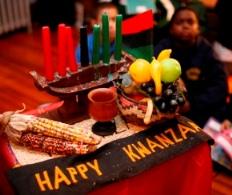Fun Facts: December Celebrations Around the World
December is one of the busiest month for celebrations.
It’s no coincidence, since many events, celebrations and festivals are loosely tied to the solstice. This is the shortest day of the year in the northern hemisphere, (and the longest day in the southern hemisphere) and it is on December 21.
In many English-speaking countries, the period of time around the December solstice is known as the holiday season, as many holidays and celebrations of different religions and cultures take place around this time.
#1 - St. Nicholas Day (also known as Santa Claus).
The tradition of Saint Nicholas Day, usually on December 6, is a festival for children in many European countries. It is related to surviving legends of the saint, and particularly his reputation as a bringer of gifts.
In most of the countries that celebrate, people give gifts to each other (telling children that St. Nicholas brought the presents), accompanied by singing. In some countries such as Belgium, this celebration is still more important than Christmas, especially for young children.
In United States and Canada, this gift-giving happens later. On December 24, Christmas Eve, each child attaches one empty stocking/sock on the fireplace. The following morning, Christmas Day, the children awaken to find that St. Nick has filled their stockings with candy and small presents (if the children have been good) or coal (if not).
Fun fact:
Santa Claus has been placed by the Fictional Forbes 15 as the richest character in the world, with a net worth of ∞ in 2002 and a net worth of "excessive" (in $billion) in 2005.
According to Forbes, he has been called out for blocking elves from unionizing and for forcing elves to work in hazardous working conditions. His large elvish work-force makes an estimated 700 million toys worth ~14 billion US dollars. They are subject to working in perpetual darkness for more than half the year in the Arctic Circle.
#2 –The Festival of Sacrifice - Eid Al Adha
Eid Al Adha is celebrated by Muslims on the 10th day of the month of the lunar calendar to commemorate the willingness of the prophet Ibrahim (or Abraham) to sacrifice his son for God. Today, Muslims sacrifice an animal—usually a goat or a sheep—as a reminder of Ibrahim's obedience to God. The meat is shared with family, friends, Muslims or non-Muslims, as well as the poor members of the community.
#3 – Hanukkah
Jewish people celebrate Hanukkah, a holiday honoring the Maccabees' victory over King Antiochus, who forbid Jews to practice their religion. For eight nights, Hanukkah is celebrated with prayer, the lighting of the menorah, and food. Children play games, sing songs, and exchange gifts.

On December 26, Kwanzaa is celebrated in the United States and Canada. It is a holiday to commemorate African heritage. Kwanzaa lasts a week, during which participants gather with family and friends to exchange gifts and to light a series of black, red, and green candles, which symbolize the seven basic values of African American family life. Those are unity, self-determination, collective work and responsibility, cooperative economics, purpose, creativity, and faith.
And of course, there is Christmas, but I don’t think I need to elaborate on that!
Do you celebrate any of these? How do you celebrate? Let us know on our Facebook page or in the comments!
Did you see any challenging words in the above blog post? Learn their meanings below!
Vocabulary:
Solstice: one of the two times each year when the sun is the furthest from the equator
Commemorate: to celebrate with honor and seriousness
Self-determination: the power or ability to make a decision for oneself without influence from outside
